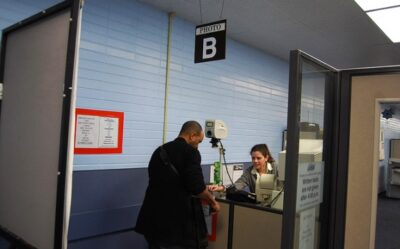Immigration at the Border

Policing the Enforcers: Criminalizing Alabama Employees Encourages Discrimination
Alabama lawmakers want undocumented immigrants to be so afraid of the consequences of the state’s new anti-immigrant law (HB 56) that they leave the state. However, that’s not the only fear factor built into the law. Under section 6(f), state and local government employees must report violations of HB 56—which includes unlawfully present immigrants even attempting to complete a business transaction with the government—or face criminal penalties. In order to avoid criminal prosecution, government employees are likely to be suspicious of foreign-looking or sounding people. But the new law does not include details or require specialized training for state employees, making discrimination, mistakes and civil rights violations all the more likely. Read More

Prosecutorial Discretion Survey Demonstrates Need for More Training, Consistency Across ICE Field Offices
It’s been almost six months since ICE Director John Morton issued new guidelines on prosecutorial discretion to help ICE agents, attorneys and other officials distinguish between high priority cases (national security threats and serious criminals) and low priority cases (DREAM Act students). A recent survey released by the American Immigration Lawyers Association (AILA) and the American Immigration Council takes a look at how well those guidelines are translating into actual practice at ICE offices around the country. While the results show that prosecutorial discretion was applied in some cases, the majority of cases show that ICE field offices are confused and hesitant to make decisions, demonstrating the need for more guidance and training from DHS headquarters. Read More

Arizona’s SB1070 Champion, State Senator Russell Pearce, Loses in Recall Election
Arizona state senator Russell Pearce, the leading force behind Arizona’s SB 1070 and other anti-immigrant legislation, was defeated in a recall election Tuesday. Fellow Republican Jerry Lewis—a moderate on immigration issues—won with 54% of the vote. Citing Pearce’s narrow anti-immigrant agenda and the damage SB 1070 inflicted on the state, a group called Citizens for a Better Arizona began the recall effort back in January. Today, many in Arizona and across the U.S. celebrate Pearce’s defeat as a victory for practical solutions over extremist rhetoric and anti-immigrant proposals. Pearce is believed to be the first Arizona state legislator to face a recall election. Read More

Bad for Business: How Alabama’s Anti-Immigrant Law Stifles State Economy
Although key provisions of Alabama’s HB 56 are on hold while its constitutionality is being tested in the courts, evidence is mounting of the growing fiscal and economic impact of the new law. State economic experts and business leaders agree that the law has already caused hardship for Alabama’s businesses and citizens. Read More

AILA-AIC Survey Reveals ICE Officials’ Sporadic Exercise of Prosecutorial Discretion
Washington, DC – The American Immigration Lawyers Association (AILA) and the American Immigration Council (AIC) released a new survey today finding that Immigration and Customs Enforcement (ICE) officers and attorneys across the country are applying different standards on prosecutorial discretion despite the issuance of national policy memoranda this summer. Read More

Provisions in Alabama’s Immigration Law Go Further Than You Think
It’s no stretch to call Alabama’s new immigration law (HB 56) extreme—especially the provision (since enjoined) which required schools to check the immigration status of students and made it a criminal misdemeanor for an unauthorized immigrant to fail to carry immigration documentation. Two provisions that may have flown under the radar, however, are the contract and business transaction which infringe on individuals’ ability to navigate everyday life (such as access to water) and leave them vulnerable to exploitation and abuse. Sadly, this is exactly what the law’s author had in mind. A new report, Turning Off the Water: How the Contracting and Transaction Provisions in Alabama's Immigration Law Make Life Harder For Everyone, analyzes just how far these provisions go. Read More

Checklist for Estimating the Costs of SB 1070-Style Legislation
(Updated November 2011) - Arizona’s infamous anti-immigrant law, SB 1070, has spawned many imitators. In a growing number of state houses around the country, bills have been passed or introduced which—like SB 1070—create new state immigration crimes and expand the power of police to enforce immigration laws. Some state laws would make E-Verify mandatory for all businesses, require schools to check students’ immigration status, or make it a crime to “harbor or transport” unauthorized immigrants. State legislators who are thinking of jumping on the immigration enforcement bandwagon, however, would be wise to consider the costs of such legislation. State immigration enforcement laws impose unfunded mandates on the police, jails, and courts; drive away workers, taxpayers, and consumers upon whom the state economy depends; and invite costly lawsuits and tourist boycotts. These are economic consequences which few states can afford at a time of gaping budget deficits. Read More

Thousands of Children Stuck in Foster Care after Parents Deported, Report Finds
A report released this week reveals yet another devastating consequence of the enforcement-only approach to immigration—a startling number of children whose parents have been detained and deported are placed in foster care and face enormous barriers reuniting with their families. According to the Applied Research Center, 1 in 4 people deported in FY 2011 (nearly 100,000 people) left behind a U.S. citizen child. The report found that the odds of reuniting the families are so low that the parents “basically fall off the face of the earth when it comes to the child welfare system.” Sadly, because of the regular increase in the number of annual deportations, this number is expected to triple in the next five years. Read More

DOJ Responds Forcefully to Civil Rights Disaster in Alabama, What Will DHS Do?
Washington D.C. – This week, the Department of Justice (DOJ) announced that it was filing suit in South Carolina to block Act No. 69 (formerly SB 20), South Carolina’s new anti-immigrant law—modeled on Arizona’s SB1070. DOJ argues—like it did in Utah and Alabama—that the law is unconstitutional and interferes with… Read More

Congressional Members to Join Civil Rights Groups in Fight Against Alabama’s “Juan Crow” Law
In the days following passage of Alabama’s extreme immigration law (HB 56), many business, religious and civil rights leaders spoke out about the law’s damaging impact on immigrant communities, farms, businesses, and schools. Since then, many notable community and civil rights leaders have stepped forward to add their voice to those demanding a repeal of the law. The Alabama NAACP, for example, recently joined immigrant rights groups to call for an end to what one African American minister described as “Alabama’s worst times since the days of segregation and Jim Crow.” This week, Illinois Congressman Luis Gutierrez met with members of several congressional caucuses—Hispanic, Black, Asian Pacific American and Progressive—to address what he calls Alabama’s “civil rights emergency.” Read More
Make a contribution
Make a direct impact on the lives of immigrants.
